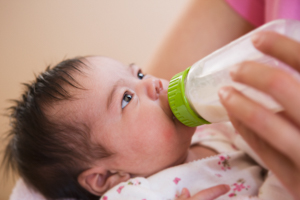Overview

What are infant formulas?
Store-bought infant formula is a product for babies when an alternative to breastmilk is needed. It's made from processed cow's milk or soybean products.
Vitamins and minerals, including iron, are added to infant formula. Formula provides all of a baby's nutritional needs before they start eating solid foods around the age of 6 months.
Store-bought formulas are made to be as similar to breast milk as possible. The safety and nutrient content of infant formula is regulated by Health Canada.
About half the calories in formula come from vegetable oils or a mixture of vegetable and animal fats. A baby's body requires fat to make and grow new cells and to support a baby's high energy needs.
Milk sugar (lactose) is the main source of carbohydrate in most cow's-milk formula, just as in breast milk.
What are some types of formulas?
Several types of store-bought infant formulas are available. Usually cow's-milk formulas are tried first.
There are other types of formulas for babies who need a different kind of infant formula. Talk to your doctor before you give your baby one of these formulas.
- Soy formulas may be recommended for babies who cannot have milk sugar (lactose), or for babies on a vegetarian diet. People also may choose soy formulas for ethical, or religious reasons. Soy formula isn't recommended for all infants. It should not be given to any infant who has a soy protein or cow's milk allergy, unless advised by the baby's doctor.
- Lactose-free formulas are used for babies who are lactose-intolerant. This is a rare problem in babies.
- Hydrolyzed protein or amino acid formulas are used for babies who can't tolerate formulas made from cow's milk or soy.
Do not use homemade formulas, such as those that use evaporated milk. These do not have the nutrients and supplements your baby needs. They could also make your baby sick.
Follow-up formulas for toddlers are also available. They may contain more iron and other nutrients than other formulas. Most healthy children don't need these formulas.
How do you prepare formula?
Store-bought formula is sold as a powder or as a concentrated or ready-to-feed liquid. Ready-to-feed formulas cost the most. But some caregivers find their convenience worth the extra cost. You must add cool, safe water to powders and concentrates. Be sure to follow the directions on the label and use the measuring device that comes with the product.
- Use the formula within 2 hours of starting a feeding, or within 2 hours of preparing it.
- If you aren't going to use the prepared formula right away, store it in the refrigerator for up to 24 hours.
- Throw out any formula that's left in the bottle after feeding your baby. After 2 hours, your baby’s saliva in the leftover formula can create growth of bacteria that can make your baby sick.
- Cover and store your open cans or bottles of ready-to-feed and concentrated liquid product in the refrigerator. Follow the recommended storage time on the product.
- Cover and store both opened and unopened cans of powder formula in a cool, dry place—not in the refrigerator. You can use the powder product for up to 4 weeks, if it's stored right.
If you have any trouble feeding your baby, talk to your doctor, nurse, or dietitian.
Adaptation Date: 04/18/2024
Adapted By: Alberta Health Services
Adaptation Reviewed By: Alberta Health Services
